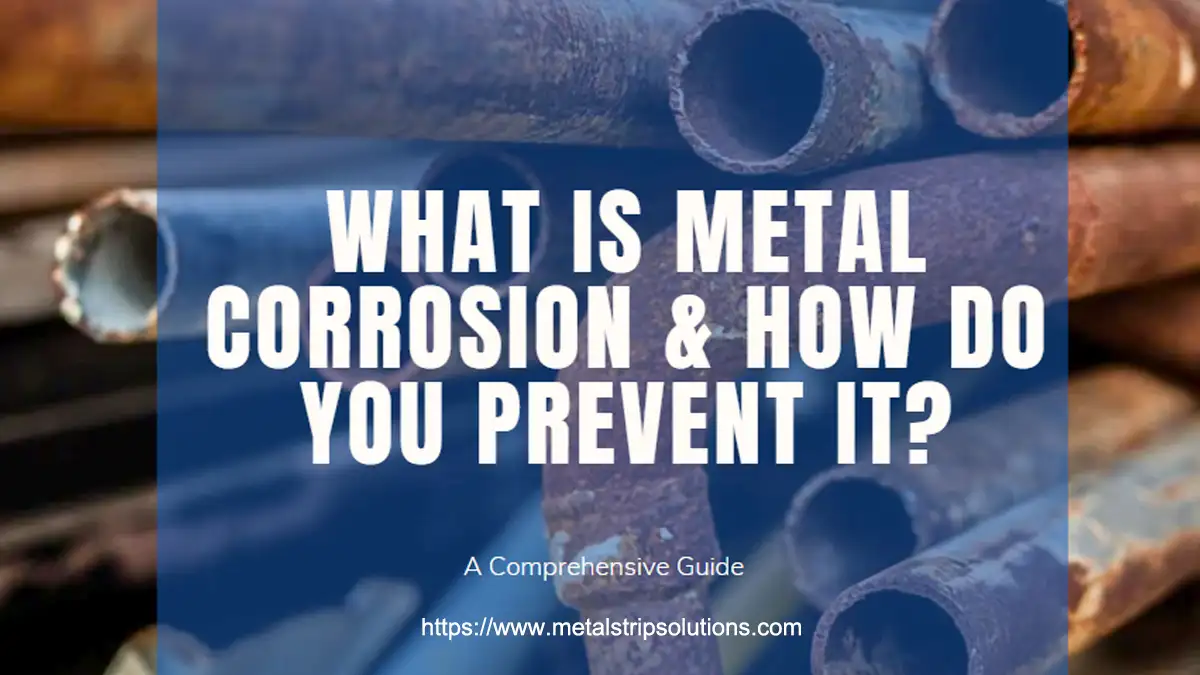Bir metalin veya metalik alaşımın çevre koşulları nedeniyle bozulmasına metal korozyonu denir..
Su, Hava ve oksitleyici maddeler korozyon sürecinde önemli rol oynayan üç ana faktördür.. Metalin korozyona uğramasını önlemek için bu faktörlerden birinin ortadan kaldırılması çok önemlidir..
Corrosion rate can be determined by the harsh weather conditions, temperature, water or humidity and contact of gases.
If the prevention methods are not applied in time, Corrosion can damage the metals very quickly. Corrosion can degrade the metal’s look and also can affect its performance in terms of durability and load-bearing capacity.
Metal corrosion can be prevented by different methods: line painting, yüzey işleme, surface oiling or greasing, chrome plating and galvanizing.
Bu makalede, we’re going to explain the basics of metallic corrosion and how you can find the correct alloy to help you prevent metallic corrosion in your projects.
What is Metallic Corrosion & What Causes Corrosion in Metals?
When the metal reacts with other substances like oxygen, hydrogen, water or electric current, a layer is formed on its surface; this layer is called metallic corrosion.
Corrosion can also occur when metals such as steel are subjected to excessive stress, allowing the material to crack. These cracks are the starting points for corrosion.
Most metals oxidize quickly, meaning they lose electrons to oxygen. Oxygen produces an oxide with the metal as it is reduced (gains electrons).
How Does Corrosion Affect Metals?
Corrosion starts when the metal comes directly into contact with air, liquid or gas, and it speeds up in extreme weather conditions and mostly in humid environments.
Corrosion can damage communication facilities, industrial process control installations, and cultural heritage monuments.
Dahası, corrosion also deteriorates critical infrastructure, including steel-reinforced roadways, electricity towers, parking buildings, and bridges.
Basit anlamda, corrosion is very harmful to the metals as well as your applications.
The Different Types of Corrosion
There are several types of corrosion some important types are elaborated in detail as follows:
General Attack Corrosion
General attack corrosion is a very common type of Corrosion. It can affect the entire surface of the metal. It is the result of chemical or electrochemical reactions. Although general attack corrosion can weaken a metal to the point of failure, it is also a well-known and predicted condition.
Localized Corrosion
Localized corrosion is known for attacking a specific area, and it has three different types according to the physical structure:
Çukur korozyonu
This type of Corrosion occurs in the holes or cavities on the surface of the metals. The following holes and cavities act as the anodic region, and the surrounding metal acts as the cathodic region.
This causes a localized galvanic reaction, which leads to a structural failure of the metal.
Crevice corrosion
This specific type of Localized Corrosion frequently occurs under gaskets, kelepçeler, and other immobile locations where low oxygen and acidic conditions can cause crevice corrosion.
Filiform corrosion
This type of Corrosion appears beneath painted or coated surfaces. Defects in the paint or coating allow water to enter, producing Corrosion beneath the protective layer and a weakened structure.
Galvanic Corrosion
Galvanic Corrosion generally occurs when two different metals come into direct electrical contact in the addition of an electrolyte, which is typically condensation, rainwater, or seawater. This type of Corrosion occurs due to galvanic interaction between the anodic and cathodic metals. Because the anode is linked, it corrodes faster, but the cathode deteriorates more slowly.
Environmental Cracking
In harsh weather conditions, some metal starts cracking and shows signs of damage. This corrosion process happens when adverse environmental conditions impact carbon steel.
What Metals Rust or Corrode?
Does Alloy Metal Rust?
Evet, only those alloys start rusting that contain iron content (ferrous metal). It is also very important to know the difference between Corrosion and rust. Corrosion is the chemical process which contains oxidation in the presence of air and water, although rusting is the type of corrosion.
Rusting takes place when we expose the metal to air and moisture, resulting in the formation of an iron oxide layer. Diğer taraftan, Corrosion happens when metals are exposed to air and chemicals, resulting in the development of metal oxides or salts.
Does Alloy Steel Rust or Corrode?
The steel is the combination of iron chromium and nickel. It also has iron content, so yes, steel can rust.
Does Aluminium Alloy Rust or Corrode?
Aluminium alloys do not rust due to no iron content in their composition. Iron is the main reason for rust. Aluminium alloys are mostly used in the aerospace industry.
Does Magnesium Alloy Rust or Corrode?
Magnesium alloys do not rust because they do not include iron. Magnezyum, diğer taraftan, is at risk of Corrosion (especially galvanic Corrosion), which appears in the form of a grey layer on top of the metal.
Does Zinc Alloy Rust or Corrode?
As we discussed earlier rust, it is a type of Corrosion which affects mostly iron-based metals like steel. Zinc alloys have no contents of iron; Öyleyse, it does not rust.
Does Nickel Rust or Corrode?
Pure nickel does not rust because it has no iron contents. Nickel also shows excellent corrosion resistance in extreme weather conditions and in chemical nature. Nickel has strong corrosion resistance in normal air, natural freshwaters, and non-oxidizing acids, as well as it has great corrosion resistance in caustic alkalis.
Sonuç olarak, nickel has great corrosion resistance and serves as an ideal foundation for developing specific alloys.
How Does Alloying Prevent Rusting?
Alloys are formed by combining several metals.
All these metals are mixed with a specific ratio and make a protective layer on the surface of the alloy, which protects this specific alloy from rusting.
This layer of protection prevents oxygen and air from passing through the metal’s surface and into the interior structure.
Different Alloying Elements & Their Corrosion Properties
Some excellent properties of different alloying elements are given below:
Krom
Resistance to oxidizing corrosives and high-temperature oxidation are characteristics of chromium alloys. Sulfidation is also improved with the chromium alloys. Pitting and crevice corrosion resistance is also enhanced by the chromium alloys.
Molibden
In aqueous chloride environments, molybdenum can improve resistance to reducing acids, çukurlaşma, and crevice corrosion.
Ütü
Iron can improve resistance to high-temperature carburizing conditions and aids in thermal expansion control. It also lowers the cost of alloy.
Alüminyum
Aluminium Improves age hardening. It can resist oxidation and work very well at high temperatures.
Bakır
Copper and its alloys can improve the resistance to reducing acids. Ayrıca, nickel-chromium-molybdenum-iron alloys enhance the resistance to hydrochloric, sülfürik ve fosforik asitler.
niyobyum
When niobium combines with carbon, it can resist intergranular Corrosion. Niobium improves high-temperature strength and Resistance to pitting and crevice corrosion.
Tungsten
Tungsten increases the strength and weldability of an alloy. It can also improve the resistance to localized Corrosion and reducing acids.
Azot
Nitrogen is also a very important alloying element. It can increase the strength of an alloy for use at high temperatures. It also improves the metallurgical stability of an alloy.
Combining These Elements with Nickel
All of these elements have outstanding properties.
Dahası, when these elements are combined with nickel in the form of an alloy, a vast range of corrosion-resistant alloys are produced to suit a wide range of conditions.
Due to their metallurgical stability, these alloys are simple to fabricate and can be thermally processed without fear of adverse effects.
Which Alloys Offer the Most Protection to General Corrosion?
Which alloy is best for the protection of general Corrosion?
It depends upon several factors like environmental conditions, the nature of the job, humidity and chemical presence.
All the nickel-based alloys are best for the protection of general corrosion.
Like 600 alaşım şerit, it is best for higher temperature applications, and AL-6XN is best where the organic acids are being used.
Methods to Prevent Corrosion
Metal Type
Getting the correct metal alloy is the most efficient approach to avoid Corrosion, which may additionally reduce the need for other preventive measures.
Protective Coatings
Paint is one of two types of paint coatings that resist Corrosion. An alternative method is powder coating, which involves sprinkling powder over a new metal surface and heating it to form a protective film.
Chemical Balancing
Corrosion occurs when metals react to various substances; Öyleyse, regulating these chemicals with great care can help to avoid it.
Sacrificial Coatings
Sacrificial coating involves layering another metal on top of the original metal surface, increasing the possibility of that metal corroding more than the one beneath it.
Design Modification
Design changes can help to prevent Corrosion. Designs should prevent retaining water and dust; they should be open for air movement and simple to service and maintain.
Çözüm
Metal corrosion is a very crucial issue for industries, and everyone wants to overcome this issue.
We are dealing in all types of corrosion resistance alloys. If you want to know which alloy is best for your application, bizimle iletişime geçmekten çekinmeyin.
Our experienced staff is ready to fulfil your requirements.












